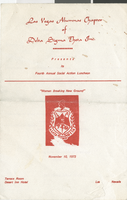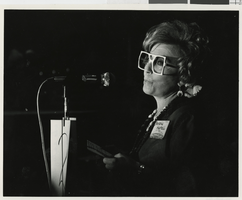Search the Special Collections and Archives Portal
Search Results
Hazel Hedges oral history interview
Identifier
Abstract
Oral history interview with Hazel Hedges conducted by Irene Rostine on October 29, 1997 for the Women's Research Institute of Nevada (WRIN) Las Vegas Women Oral History Project. Hedges opens her interview by discussing her move to Las Vegas, Nevada from Kansas in 1952. She discusses what it was like to move across the country at that time and her search for employment. Hedges describes her work as a waitress at the Thunderbird Hotel and her true interest, real estate. Hedges talks about her real estate career which began in 1960, how that job allowed her to see Las Vegas grow, and her success in the industry. Lastly, Hedges discusses organizations at the time that assisted in the training of women realtors and her own community work.
Archival Collection
Viola Johnson oral history interview
Identifier
Abstract
Oral history interview with Viola Johnson conducted by Claytee D. White on March 03, 1996 for the Women's Research Institute of Nevada (WRIN) Las Vegas Women Oral History Project. Johnson discusses leaving Fordyce, Arkansas in 1942 to join her parents in Las Vegas, Nevada where her first home was a tent. Johnson goes on to discuss life with her parents in Las Vegas including their work and church activities. Johnson also describes her work at the Flamingo Hilton and Sands Hotel and Casino as a maid, and at the Riviera Hotel and Casino making sandwiches. Finally, Johnson talks about labor conditions and the Culinary Union during the early years of the Las Vegas Strip casino development.
Archival Collection

Transcript of interview with Nancy Houssels by Caryll Batt Dziedziak, November 18 & December 14, 1998
Date
Archival Collection
Description
What is the importance of dance? For Nancy Claire Houssels, it has simply shaped her life! Born on February 26, 1935 to Edith Darlene Wallace and William Edwin Wallace, Nancy grew up with three brothers in an athletic household in Piedmont, California. She began dancing at the early age of three and filled her childhood years with dance and synchronized swimming. After attaining a Bachelor of Arts Degree in Theatre Arts from UCLA in 1957, Nancy went on the road with the Hollywood Bowl; soon meeting her future dance partner, Francois Szony. Already known as one of the most respected adagio dancers in the world, Szony would become Nancy’s dance partner for the next ten years. The Szony and Claire adagio team rehearsed in New York City before heading off to their first European engagement at the London Palladium. The team spent the next few years appearing in London, Copenhagen, Paris, Vienna, Rome, Turino, Milan, Barcelona, and even Beirut. Their physical ability to perform breath-taking spins and lifts appealed to broad audiences; even those with little or no appreciation of ballet. After returning to the states, Szony and Claire performed in Miami, Puerto Rico, and throughout New York; including Radio City Music Hall, the Ed Sullivan Show, Carnegie Hall, and Madison Square Garden. In 1966, the dance team headed to Las Vegas, Nevada to appear with the Casino de Paris at the Dunes Hotel. Shortly thereafter, in 1968, Szony and Claire joined the cast of the Folies Bergere at the Tropicana Hotel. In May 1970, Nancy married J. Kell Houssels, Jr., then the President of the Tropicana Hotel. As Nancy likes to retell this moment, “Well, my husband fired me and we got married!” After more than thirty years of dancing, Nancy felt ready to end her professional dance career and looked forward to starting a family. Nancy and Kell subsequently had two children: Kelly Clair and Eric Wallace, and Nancy happily ‘inherited’ three stepchildren: Josh, Jake, and Leslie. The adjustment of shifting from a career characterized by a grueling work schedule to that of domestic life proved challenging for Nancy. She soon began looking for ways to involve herself in the community. Since the early 1970s, Nancy has lent her time and support to such diverse entities as Child Haven, Children’s Service Guild of the Clark County Juvenile Court System, National Conference of Christians and Jews, PBS Friends of Channel 10, Nathan Adelson Hospice, Meadows School, United Campus Ministry, Las Vegas Metropolitan Beautification Committee, McCarran Airport Arts Advisory Committee and the University of Nevada, Las Vegas Foundation. While Chair of the Nevada State Council of the Arts for seven years, she proved instrumental in establishing a Folk Arts program and expanding legislative funding for statewide arts programs. Nancy’s service to the community has been recognized with such awards as the 1985 Nevada Dance Theatre’s Woman of the Year, the 1988 Governor’s Arts Award - Distinguished Service to the Arts, the 1994 State of Nevada’s Women of Achievement, and the 1997 We Can, Inc.’s Chris Schaller Award for children’s advocacy. Although her days as a professional dancer had ended, Nancy never relinquished her love of dance. In 1972, Nancy joined Vassili Sulich in founding the Nevada Dance Theatre. As the principal dancer in the Folies Bergere, Sulich had organized a series of dance concerts for the Las Vegas community. Much to Nancy’s surprise, the Las Vegas community responded enthusiastically to the availability of ballet performances. Nancy quickly formed a volunteer board to raise the critically needed funding for this endeavor. She began with an evening fundraiser at her home, inviting a group of like-minded friends. This effort raised the initial fifteen thousand dollars that set the Nevada Dance Theatre on its way. In 1976, the company acquired its non-profit status and subsequently formed an academy to train children in dance. Nancy played an instrumental role in furthering the ballet company’s community outreach; creating such programs as Future Dance funded by the Lied Foundation. This program targets lower income children who attend at-risk elementary schools and provides them with free dance instruction…building self-esteem, confidence, and hope. In 1996, with a capital grant from the Donald W. Reynolds Foundation and land donated by the Howard Hughes Corporation, the Nevada Dance Theatre began drawing their plans for a world-class facility in Summerlin. Completed in 1999, the company now had a visible home within the Las Vegas community. Here, students from the Las Vegas community trained alongside the company’s professional dancers. Renamed in 1998 as the Nevada Ballet Theatre and with a new Artistic Director, Bruce Steivel, the Company continues to serve not only as a leading force for live performing arts, but also as a source of community outreach programs for children. Nancy continues to remain involved with the Nevada Ballet Theatre and currently serves as the Co-Chair of the Company. She believes her life experience reflects both the viewpoint of the artist and that of the audience. Indeed, her visionary leadership and love of dance has not only shaped her life but has nurtured the development of the cultural arts in Southern Nevada.
Text
Dorothy Grier oral history interview
Identifier
Abstract
Oral history interview with Dorothy Grier conducted by Barbara Agonia on November 26, 2002 for the Women's Research Institute of Nevada (WRIN) Las Vegas Women Oral History Project. Grier begins her interview discussing her family and life growing up in the small town of Bulter, Indiana in the 1930s and 1940s. She then discusses her life in chronological order pausing to highlight events including working for the Nevada Test Site.
Archival Collection

Program from the Delta Sigma Theta Fourth Annual Social Action Luncheon, November 10, 1973
Date
Archival Collection
Description
Program from the Delta Sigma Theta Fourth Annual Social Action Luncheon: "Women Breaking New Ground." The luncheon was held at the Terrace Room at the Desert Inn Hotel.
Text
Bernice Jaeger oral history interviews
Identifier
Abstract
Oral history interviews with Bernice Jaeger conducted by Joanne L. Goodwin on July 25, 1997, July 30, 1997 and February 03, 1998 for the Women's Research Institute of Nevada (WRIN) Las Vegas Women Oral History Project. Jaeger begins the interviews by discussing her introduction to the hotel industry while attending Clark County Community College in the 1970s. Jaeger discusses working at the Rivera Hotel and Casino, Aladdin Hotel and Casino, and Continental Hotel and Casino, her experiences at these properties, and the important people associated with them. Jaeger describes how the increase in availability of hotel management programs at universities in the 1980s opened up the industry to women. Jaeger also talks about how many people in the Las Vegas, Nevada hotel and gaming industry came from Kentucky, where the gaming industry was only partially legal. Finally, Jaeger discusses her family life and raising her children.
Archival Collection

Photograph of Beverly Harrell Las Vegas (Nev.), June 1977
Date
Archival Collection
Description
Image
Harriet Trudell oral history interviews
Identifier
Abstract
Oral history interviews with Harriet Trudell conducted by Caryll Batt Dziedziak on May 03, 2006 and July 25, 2006 for the Women's Research Institute of Nevada (WRIN) Las Vegas Women Oral History Project. Trudell begins by discussing her early life, her parents, and attending boarding school. Trudell goes on to discuss her father's political activism and her grandparents' impact on her life. Trudell then describes her adult life in St. Petersburg, Florida with her husband and young children and their move to Las Vegas, Nevada in 1962. Next Trudell talks about marching in civil rights demonstrations, including at Selma, Alabama. Trudell continues to discuss her activism in a variety of social movements including labor unions, school integration, women's rights, and welfare rights.
Archival Collection

Transcript of interview with Liliam Lujan Hickey by Layne Karafantis, March 18, 2010, & March 25, 2010
Date
Archival Collection
Description
Liliam Lujan Hickey is best known in the state of Nevada for being the first Hispanic woman elected to the State Board of Education as well as for the enormous contributions she made while serving from 1998 to 2000. For this, an elementary school in Clark County bears her name. Despite many obstacles, Liliam has continually dedicated herself to standing up for the causes she believes in, such as providing preschool education to the underprivileged, preparing youth to enter the workforce, helping other Hispanics run for office, and proving that with enough courage anyone can accomplish their dreams. Born in Havana, Cuba in 1932, Liliam led a sheltered life that revolved mostly around her studies at a French Dominican school. She met her first husband, Enrique Lujan, when she was only sixteen and they wed soon after. Enrique was twelve years her senior, owned many casinos on the island, and provided a luxurious existence for Liliam and their three children. However, this lifestyle abruptly changed when Castro assumed power in 1959 and Liliam and her family were compelled to relocate to the United States. In Miami, Enrique assisted other refugees financially, hoping that his wealth would remain secure in Cuba. He was wrong. This left the family destitute. In addition to casinos, Enrique had been Cuba?s coach for the Olympics. He moved the family to York, Pennsylvania, where he hoped to find work at the York Barbell Company. Liliam, who had been accustomed to having maids and nannies in Cuba, found herself doing all the housework while she also worked in a factory. The change could not have been more dramatic and the living conditions became unbearable. The family chose to move to San Diego in a Volkswagen Minivan with the hope for a better life. The next few years brought many transitions. Things did turn around in San Diego, and Liliam she recalls her years in southern California as some of the happiest of her life. Liliam found a job working at the Scripps Clinic in La Jolla. After a few years, Enrique found a job in Las Vegas and the family moved again. In Las Vegas, Liliam gave birth to her fourth child, Mary, and life once again became financially difficult for the family. In 1972, the situation grew worse with Enrique?s untimely death. Liliam was a widow at forty years of age. She had to teach herself how to drive a car, write checks, and perform financial tasks that Enrique had insisted on managing while he was alive. Determined not to give up, however, she worked tirelessly to keep the family together. Amidst all this, a friend introduced Liliam to Tom Hickey, and after a brief courtship they were married in 1981. Within a few years, Liliam became active in politics, running for the State Board of Education. Her campaign manager advised her that voters would not be receptive to photos of a Hispanic woman on billboards, and to capitalize on the name “Hickey,” which was a recognizable name because her husband was an assemblyman. She took the manager?s advice and was elected in that campaign and for two more terms, the maximum limit for the office. After the first race, she proudly displayed her face on billboards across the state. During her time at the State Board of Education, Liliam dedicated herself to helping all children receive a better education in Nevada, not only Hispanics. She co-founded the Classroom on Wheels [COW] program, which brought buses to poor neighborhoods to provide pre-school education. She established Career Day, which pairs high schools students with business professionals in an effort to help them make the transition into the workforce. While the COW program is no longer running, 8 Career Day still operates and awards scholarships in Liliam?s name annually, which helps youth receive the educational opportunities they need to succeed. And she involved Hispanic youth in Boy Scouts by bringing ScoutReach to the Las Vegas valley. Lujan Hickey worked in a wide array of other community organizations. In the 1970s, she began to work with Circulo Cubano, which later became the Latin Chamber of Commerce, and she would later belong to the National Chamber of Commerce. A longstanding member of the League of Women Voters, Liliam saw the need to get Hispanics more involved in politics in the state. Her story is one of great inspiration, and when asked why she does it, she simply replies with a smile, “I love life.” Hickey?s narrative offers the reader a glimpse of the experiences of the Cuban refugee experience in the U.S. in general. Specific to Las Vegas, it provides a rare story of the experiences of early Latinas in the political and economic development of Las Vegas in the last half of the twentieth century.
Text
Marge Conley oral history interviews
Identifier
Abstract
Oral history interviews with Marge Conley conducted by Claytee White on May 06, 1998 and July 09, 1998 for the Women's Research Institute of Nevada (WRIN) Las Vegas Women Oral History Project. Conley opens her interviews discussing her childhood in Chicago, Illinois during the Great Depression including her experience working at a young age to help her family. She discusses her experiences with unions throughout the country and using her union traveling card to transfer from Chicago to Las Vegas, Nevada. Conely talks about her career as a server at the Desert Inn and Caesars Palace including topics about staffing, wages, and working conditions. She describes her association with the Culinary Workers Union Local 226, how strikes were organized, and the union's efforts to improve others' lives. She also talks about how the local Culinary Union helped promote women and African Americans into leadership positions. Conley ends her interview discussing the importance of unions and the need to continue them in the future.
Archival Collection
